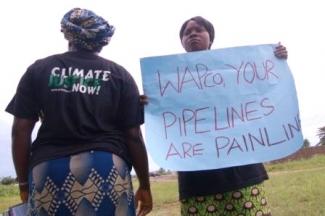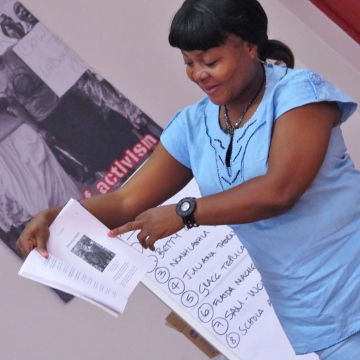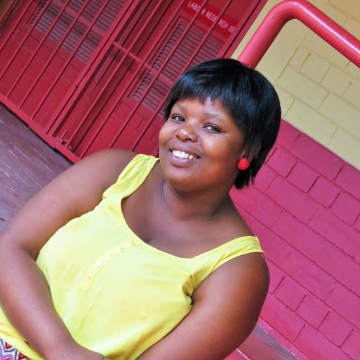



JASS Southern Africa (JASS SNA) sat down with two activists who are saying “No!” to Big Coal: Nomonde Nkosi, a young feminist activist from rural Mpumalanga, South Africa and Betty Abah a poet-environmentalist from Nigeria. Despite the distance that separates them and their contexts, their powerful stories illustrate women’s courage, leadership and organization in standing up to multinational extractive corporations—natural gas, oil, coal and precious minerals—backed by governments and devastating women’s lives and the environment.
Betty and Nomonde are a part of—WoMin—a JASS ally and growing solidarity network of organizations and activists who focus on women’s leadership and voices united in the fight against environmental injustice and the violence inflicted by extractive industries across the African continent.
Betty Abah is a journalist, poet, human rights activist and environmental justice advocate, and, more recently, founder of the Centre for Children’s Health Education, Orientation and Protection (Cee-Hope Nigeria). Betty had been working as a journalist for nearly a decade when she switched her career to campaign for environmental justice and, in particular, for the rights of women at the frontlines of struggles against multinational natural gas and oil companies in the Niger Delta.
been working as a journalist for nearly a decade when she switched her career to campaign for environmental justice and, in particular, for the rights of women at the frontlines of struggles against multinational natural gas and oil companies in the Niger Delta.
I read an article that drew my attention to the situation of women and their communities in the Niger Delta and the impact of the oil and gas extraction and other mining activities on their daily lives. There had been a gas flare—incredibly dangerous—and the writer described how they could feel the heat from the gas flare when they were standing in the middle of this village. It was so hot that they couldn’t stand there. They wondered how people were even able to stay in that community. But where else were these people supposed to go? To them it was normal to live with that heat. Every day, they were forced to breathe in poisonous gasses and it caused side effects that research doesn’t even tell just how extensive—ovarian cancer, respiratory problems, children born with deformities. And nobody cared! The government wouldn’t stop it because where there is oil it means money—90% of the country’s revenue is from oil. The companies were not bothered by environmental laws, so they just left people to fend for themselves. It was about money and profit, the people don’t matter. So I joined the Environmental Rights Action in Nigeria as a Gender Focal Person because I thought that I should be in the middle of the struggle, I shouldn’t just write about it—I wanted to be part of it.
“[I saw] that there was—at community levels—a sort of injustice or marginalization as women were not consulted or carried along in matters of general concern, and their voices were mostly stifled in the push for justice. While everyone grapples with pollution of the environment, women in most of Niger Delta communities and indeed, in communities ‘cursed’ by the presence of mineral resources, have had to deal with extreme forms of poverty in what we call the feminization of poverty. The typical woman also has no claim to any land as dictated by patriarchy… so she is first at the mercy of the community and then that of the multinationals that are often involved in annexing communal land and resources. Tradition effectively ensures she can’t claim anything in instances of compensation for lost land and resources.” ~ A Word is Enough for the Wise, Betty Abah
We worked in almost all the states of the Niger Delta, mobilizing women and sensitizing them to their rights. The highlight was a four-country project where we researched the gender impacts of the West African pipelines in Nigeria, Ghana, Togo and Cameroon. This project was supported by Friends of the Earth International (Netherlands), Gender Action, Environmental Rights Action (Nigeria) and several affiliates in each country. The research revealed serious violations, including loss of livelihoods. Many women who ran fisheries lost their businesses because the rivers were so polluted and this meant water contamination that affected people’s health. Women did not have the opportunity to speak out on loss of land and property. The cost of these multinational extractive companies is huge for women. Many women were stripped of their lands without compensation. In most cases, these women were farming on their husband’s or father’s lands so the property was not in their names. This meant that they would receive little to nothing of the compensation, which was already minimal. (Read: Broken Promises: Gender Impacts of the World Bank-Financed West African and Chad-Cameroon Pipelines). And what could they say or do? These are big companies like Chevron funded and backed by the World Bank and the African Development Bank.
That was one of the striking images in my heart. I decided to really work at it and plunge myself into it to fight for some form of justice for the people. It was (and still is) important for me that the voices and stories of these women be heard so that people can see the price of these industries on real people.
What does justice mean to me? There’s a small community in the Rivers State of the Niger Delta that has managed to stave off oil companies for about twenty years following the hanging of their kinsman writer and environmental activist Ken Saro-Wiwa by the then Nigerian military junta in 1995, for demanding for environmental justice. And it has taken that amount of time for the community to recover from decades of extractivism that took place in their land and environment. Now, life has returned there. The trees and flowers are blooming, the water is drinkable, and people are living life. And so when we talk ‘justice’, it’s not just monetary compensation. It’s how we get to a time and place when people can live their lives fully and safely, take advantage of the resources in their community and their environment, and be conscious of their rights as human beings.
Nomonde Nk osi hails from a small mixed farming and mining town, primarily coal, called Carolina, which is in the Mpumalanga province. An activist since she could “walk”, Nomonde joined the Women from Mining Affected Communities United in Action (WAMUA) to fight for and with the women in her own community. Over the last year, she has worked with WAMUA to lead research to better understand women’s experiences.
osi hails from a small mixed farming and mining town, primarily coal, called Carolina, which is in the Mpumalanga province. An activist since she could “walk”, Nomonde joined the Women from Mining Affected Communities United in Action (WAMUA) to fight for and with the women in her own community. Over the last year, she has worked with WAMUA to lead research to better understand women’s experiences.
At the end of the day, everything that’s happening affects women the most. When there is no water in the house, who must fetch it? The mother, the girls, the sisters.
If you drink water from the taps in Carolina, you will have a running stomach. I’ve seen children develop skin rashes. Any clothing you wash with that water becomes discolored. Sometimes there is no water at all but the municipality doesn’t explain what happened to the water. But they will come running back to us in 2016—an election year—in order to get votes.
Mining is such a big industry in the whole province, so there is a lot of migrant workers. Often, women are the ones who are “left behind” to take care of the family and survive somehow.
Many families have lost their land to the mining companies. One woman told me, “this is what the ‘white people did’: they came with some papers but [we had no one to help us understand the papers], so the white people told us to sign on those papers for ten years to allow them to mine and that we will own 40%.” To this day, no one in that community has seen any meaningful benefit.
Together with WAMUA, I have tried to meet with councilors to challenge what is happening. The problem is in Caroline is that when you stand up and talk to the councilor or whoever, you become a threat to them. So instead, I have supported some of my comrades (friends and colleagues) to go instead. But being here in this space and hearing sisters from around Africa who are coming from countries where a woman doesn’t speak—and yet they stand up and fight is a lesson for me.
My dream is that women should be more informed, and they should have the power to stand and hold each other’s hands so that if you fall, I fall with you—we fall together. If something happens to you, then I’ll be there. If I fall, I know there’s someone behind me who’s going to catch me.